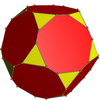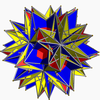Small retrosnub icosicosidodecahedron
| Small retrosnub icosicosidodecahedron | |
|---|---|

| |
| Type | Uniform star polyhedron |
| Elements | F = 112, E = 180 V = 60 (χ = −8) |
| Faces by sides | (40+60){3}+12{5/2} |
| Coxeter diagram | |
| Wythoff symbol | | 3/2 3/2 5/2 |
| Symmetry group | Ih, [5,3], *532 |
| Index references | U72, C91, W118 |
| Dual polyhedron | Small hexagrammic hexecontahedron |
| Vertex figure |  (35.5/3)/2 |
| Bowers acronym | Sirsid |

In geometry, the small retrosnub icosicosidodecahedron (also known as a retrosnub disicosidodecahedron, small inverted retrosnub icosicosidodecahedron, or retroholosnub icosahedron) is a nonconvex uniform polyhedron, indexed as U72. It has 112 faces (100 triangles and 12 pentagrams), 180 edges, and 60 vertices.[1] It is given a Schläfli symbol sr{⁵/₃,³/₂}.
The 40 non-snub triangular faces form 20 coplanar pairs, forming star hexagons that are not quite regular. Unlike most snub polyhedra, it has reflection symmetries.
George Olshevsky nicknamed it the yog-sothoth (after the Cthulhu Mythos deity).[2][3]
Convex hull
[edit]Its convex hull is a nonuniform truncated dodecahedron.
 Truncated dodecahedron |
 Convex hull |
 Small retrosnub icosicosidodecahedron |
Cartesian coordinates
[edit]Let be the smallest (most negative) zero of the polynomial , where is the golden ratio. Let the point be given by
- .
Let the matrix be given by
- .
is the rotation around the axis by an angle of , counterclockwise. Let the linear transformations be the transformations which send a point to the even permutations of with an even number of minus signs. The transformations constitute the group of rotational symmetries of a regular tetrahedron. The transformations , constitute the group of rotational symmetries of a regular icosahedron. Then the 60 points are the vertices of a small snub icosicosidodecahedron. The edge length equals , the circumradius equals , and the midradius equals .
For a small snub icosicosidodecahedron whose edge length is 1, the circumradius is
Its midradius is
The other zero of plays a similar role in the description of the small snub icosicosidodecahedron.
See also
[edit]References
[edit]- ^ Maeder, Roman. "72: small retrosnub icosicosidodecahedron". MathConsult.
- ^ Birrell, Robert J. (May 1992). The Yog-sothoth: analysis and construction of the small inverted retrosnub icosicosidodecahedron (M.S.). California State University.
- ^ Bowers, Jonathan (2000). "Uniform Polychora" (PDF). In Reza Sarhagi (ed.). Bridges 2000. Bridges Conference. pp. 239–246.
External links
[edit]- Weisstein, Eric W. "Small retrosnub icosicosidodecahedron". MathWorld.
- Klitzing, Richard. "3D star small retrosnub icosicosidodecahedron".























